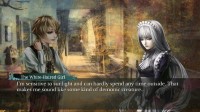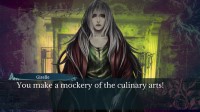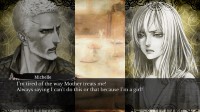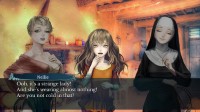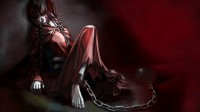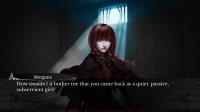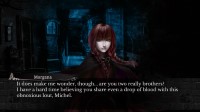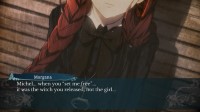The House in Fata Morgana
Playtime: 50 Hours
Finished 25 July 2024.Finished the main game, the prequel (A Requiem for Innocence), the epilogue (Reincarnation), and all of the short stories - just about everything that's included in this version of the game. I forget the exact splits but I believe the main game took around 25-30 hours, the prequel was about half that length and Reincarnation was relatively short.
This game is widely regarded as one of the best VNs out there, and yet I never had enough of an interest to give it a fair shot until now. For my part, I think a number of the reasons I didn't decide to try it out were definitely related to the strange artstyle, which is profoundly different from most other VNs - especially earlier on, when I mostly played more "generic" character-focused VNs. Also, the presentation of the game doesn't neatly fit into any particular category - the entire premise of the game is founded on a mystery presented to you at the start, the dark corridors of the mansion hint at some kind of paranormal horror experience, yet as the game continues on it slowly becomes more of a romance. The numerous twists and turns taken by the story all the way throughout to me defined an unpredictable and climactic experience that I wish I could experience for the first time again.
The first half of the base story gives kind of a strange impression; it's a series of three completely disconnected stories with a few common points: the presence of a young white-haired woman, the continued existence of an ephemeral non-aging maid, and a tale of great misfortune, all within the same location - a haunted manor under the curse of the witch Morgana. At the outset, most of the details are obscured so very little makes sense. Since these stories take place over the span of several hundred years, it's hard to consider that your character is intimately connected with them. Also, given the frequent changes in scenery across the first four chapters with different characters enacting different situations, the early parts of the game did make it a bit difficult to maintain interest. I think it actually took me a couple of weeks to make it past the very first chapter, then another few days for the second - these short stories aren't particularly noteworthy on an individual level.
At the halfway point, the game presents the first big twist - the eerie Maid that has guided you throughout the manor is not the witch Morgana, but Giselle - the lover of Michel, the inhabitant of the empty manor and the true identity of the player character. Up until this point, I was constantly questioning what perspective the story was told from; I had assumed it to be Morgana at first simply because the mansion was associated with her - before this reveal there were a few red herrings tossed out for the character (the most significant of which was the white-haired girl). At this point, the game starts to open up about the true history of the two, overwriting the idealized tale woven in the fourth chapter. It details Michel's 10-year seclusion and suspicion of Giselle, who was quite suddenly sentenced to the mansion as a punishment for defying her masters at the Bollinger estate. It's much more personal-feeling than the first few chapters, with less of a "perfect tragedy" vibe, instead showing how a mentally-scarred Michel could not stand to trust another after a decade of neglect. It's very briefly heartwarming how he's eventually able to change himself, though the happiness is short-lived as the story, and Michel's previous life, end abruptly once the wider world realizes that he's still alive.
The last few chapters continue along this theme; Giselle's torment after Michel's death, suffering the taunts from the spirit of the witch Morgana for hundreds of years as she served as the permanent caretaker of the mansion as it moved through the ages, how she turned into the cold, soulless Maid we see in the first half of the game to protect herself from insanity. As the plot sweeps through their histories, there's a slow realization that Michel, Giselle, and even Morgana (even though she suffered by far the worst) are all very similar in their misfortunes. Disgust at Morgana's actions and endless cruelty fades to a sort of pity as we see how her circumstances were shaped throughout a life characterized by endless torture, first by herself in the belief that she was helping others, then by others using her for their own gain - or pleasure. The three characters in the first three stories were actually reincarnations of the worst offenders who ultimately took her original form captive and drained her until her death all those years ago.
The end of the game pulls another quick one; it turns out the three unfortunate souls were not entirely black-hearted villains as it may have seemed, but were somewhat forced by circumstance to make the decisions they made. While Morgana saw Mell as a traitor, his hand was forced through his need to maintain Nellie's health, as well as from the threats of Yukimasa. Meanwhile, Yukimasa was simply a sword for hire who required the tether of Pauline, and whose limited skillset and psychopathy meant he simply did not know any better. Finally, Jacopo already knew he was entirely in the wrong, but thought the sacrifice of a single "witch" for the prosperity of all his people would be a worthy tradeoff (ironically enough), and could put him one step closer to his dream to show Morgana the world. In each case, their intentions did not pan out as desired, leaving the entire thing a complex mess. Against the odds, Michel is eventually able to convince Morgana to finally let her old grudges go, releasing her 3 prisoners from their sentences - but not for their sake, but rather for her own, to free herself from the curse that affected her as it did her victims.
Overall, I found this story to be profoundly beatiful on so many different levels. Of course, the tragedies in the first few chapters each feel like miniaturized Greek plays in the way they elicit a feeling of shock and even terror at the final downturn, but they are merely a precursor to the drama of the latter chapters. This game seeks to show how seemingly correct decisions can give way to terrible tragedy and suffering, certainly not without fault but at least without the targeted malice originally perceived. At the same time, this game also seeks to inform the player how unbridled hatred causes pain and suffering for everyone involved; the victims, who don't have a chance to learn and grow from their mistakes, and the perpetrator, who traps themselves in their own vortex, refusing to let go and move on. In a way, I feel like the somewhat ambiguous and open-ended ending (before the final scene) wraps up the game very well on its own, as the final destination of the story is really the characters leaving the mansion as it crumbles - towards an uncertain future. It's very difficult to consider this game joyful, but at the very end there is a faint glimpse of hope granted to the player following Morgana's redemption.
This stream of consciousness commentary may not sell it very well, but as one of the most highly-regarded VNs my experience playing through this still managed to surpass my lofty expectations. Even given the slow start, I think the overall pace and composition of the game is exquisite - it never drags its feet, yet never rushes ahead too quickly either.
A Requiem for Innocence
This is a prequel to the story, specifically focusing on Jacopo's role in Morgana's early life; first, how he freed her from captivity to at least live without the torturous blood sacrifices done at the mansion. Then, how his incessant focus on achieving status and importance in life ultimately cost him everything he held dear, leaving him unable to fulfill his deepest promise to Morgana - that one day he would be able to show her the world, and where their ancestors came from. Since there was already a fairly thorough recounting of Morgana's life in the original game, this episode doesn't add very many surprises to the overall story, but rather gives depth to the world and the characters in places that were skimmed over previously. Jacopo's convictions and decisions are laid bare, showing how his originally clear-headed and pure intentions were slowly twisted; not entirely out of greed as would be expected, but rather due to a lack of understanding and preparedness for the difficulty of the path he chose as ruler of the city. When he turned into a tyrant, it was not because he did not care for his people, but instead because he cared too much about his apparent wealth and status in the belief that he could not inspire confidence or project power without it.
So the title of this prologue is ultimately referring to Jacopo, who throughout all of his mistakes never actually turned as inwardly cruel or devilish as the original game made him seem. He was simply too focused on chasing the wrong things and paid a disproportionately terrible price for it. I was surprised throughout the second part especially how he knew that he already went too far to be redeemed, characterized by his soul's inability to move on towards reincarnation after being released by Morgana; he had to be guided by her away from the illusion he created for himself, where he had intended to pass into nothingness.
Despite my initial concerns with this episode pretty much being a rehash of one of the later chapters in the original (with more detail and character interaction), I greatly appreciated the additional insight granted into the motivations of Jacopo in his first life. The deeper into his regrets really elevated his character beyond the brief glimpse we saw, and made for a story that perfectly continues the tone and quality of the original game.
Reincarnation
To very briefly comment on this second added episode, this is the true sequel to the original game and chronologically the end of the story. It takes place in modern-day Paris, where all of the players of the original game somehow managed to reappear, together at the same time and place. The conflicts between each pair of characters is largely the same as in the original game (minus the White-Haired girl, of course) except their souls vaguely remember the mistakes they made in their past lives, and manage to move beyond them this time. There's not too much else to say - it's not an overly-happy sequel but all of the threads are tied together quite neatly. It's not written with anywhere near the same level of finesse as either of the previous episodes but manages to be a decent slice-of-life with a reassuring undertone, basically to satisfy the audience in knowing that the freed souls do not simply fall into the same vices again.
The only thing I will say to the negative is that Yukimasa and Pauline have a weird-ass relationship in this one. While Nellie/Mell, Morgana/Jacopo, and of course Giselle/Michel are able to move forward with their lives and to fully resolve the issues that had prevented their happiness before, for some reason this one story just couldn't get it right still. To put it bluntly, nothing was actually resolved, and Yukimasa is just as fucked up as ever; the only "change" is that Pauline turns out to also be messed up and is totally OK with him killing her? I have no idea where this shit came from but they need to put it back; there's no mention of attempting counseling, or properly working with her to have a proper life. It's actually retracted compared to his Reincarnation self, who was at least very well tethered by Pauline way back when.
